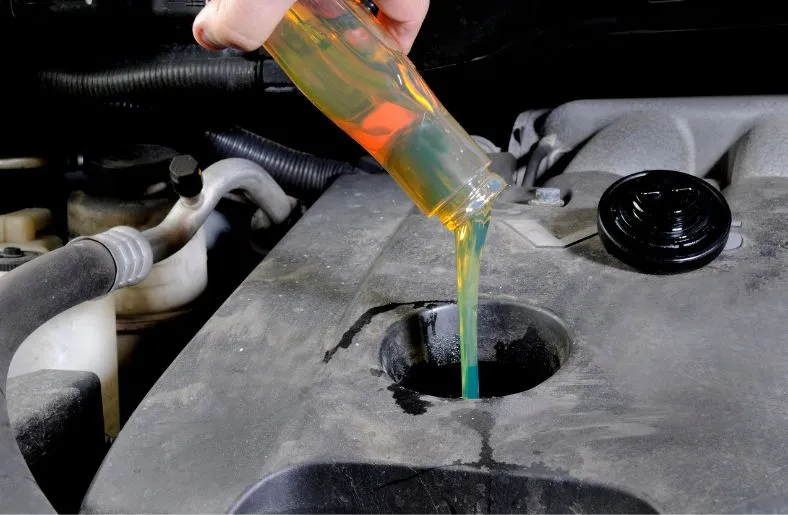Burning oil in an engine can be a frustrating and potentially costly problem for car owners. It not only leads to excessive oil consumption but also results in emissions of blue smoke, which is both harmful to the environment and embarrassing when you’re on the road. Fortunately, there is a solution: engine oil additives.
In this comprehensive guide, we will explore how engine oil additives stop burning oil, saving you money on oil top-offs and potentially extending the life of your vehicle.
Table of Contents
Why Does Engine Oil Burn?
Before we delve into the solution, it’s crucial to understand why engine oil burns in the first place. When your engine operates, it generates intense heat due to the combustion process. This heat can lead to the evaporation and burning off of engine oil over time. However, excessive oil burning is typically indicative of an underlying issue within the engine.
Common Causes of Engine Oil Burning
- Worn Piston Rings: Over time, piston rings can wear out, allowing oil to seep into the combustion chamber, where it gets burned along with the fuel.
- Faulty Valve Seals and Guides: Damaged valve seals or worn valve guides can permit oil to enter the combustion chamber, resulting in oil consumption and the emission of blue smoke.
- Cylinder Wall Damage: Damage to the cylinder walls can create gaps or rough surfaces, enabling oil to seep into the combustion chamber and burn.
- PCV System Issues: A malfunctioning Positive Crankcase Ventilation (PCV) system can lead to increased pressure in the crankcase, pushing oil into the combustion chamber.
- Incorrect Oil Viscosity: Using the wrong oil viscosity for your engine can affect its ability to properly lubricate internal components, potentially contributing to oil consumption.
Now that we have identified the root causes, let’s explore how engine oil additives stop burning oil and can help put an end to this problem.
How Engine Oil Additives Stop Burning Oil?
The Role of Engine Oil Additives
Engine oil additives are specially formulated compounds designed to enhance the performance of your engine oil. They contain various chemicals and compounds that can address some of the common causes of oil burning while providing additional benefits for your engine’s health.
Restoring Compression and Sealing Gaps
One of the primary causes of oil burning is worn piston rings or damaged cylinder walls. Engine oil additives often contain seal conditioners and viscosity improvers that can help rejuvenate worn seals and rings. These additives work by softening and expanding these components, effectively sealing any gaps and reducing oil consumption.
Cleaning and Preventing Deposits
Deposits in the combustion chamber can also contribute to oil burning. Additives containing detergents and dispersants can help break down and remove these deposits, ensuring that the combustion process is clean and efficient. A cleaner engine is less likely to consume excess oil and will run more smoothly.
Reducing Friction and Wear
Engine oil additives typically contain anti-wear agents that reduce friction between moving parts. This not only extends the life of crucial engine components but also reduces the likelihood of oil being burned due to excessive friction.
Improving Oil Viscosity
Using an engine oil additive can help improve the viscosity of your oil, ensuring it flows smoothly and provides adequate lubrication to your engine’s components. This can be especially important if you’ve been using the wrong viscosity oil, which may contribute to oil consumption.
Maintaining Proper PCV System Function
Some additives are specifically designed to clean and maintain the PCV system, ensuring that it functions correctly. A well-maintained PCV system helps regulate crankcase pressure, reducing the chances of oil being pushed into the combustion chamber.
Choosing the Right Engine Oil Additive
Not all engine oil additives are created equal, so it’s essential to choose the right one for your vehicle. Here are some factors to consider:
Compatibility: Ensure that the additive is compatible with your engine oil type and meets the specifications recommended by your vehicle manufacturer.
Additive Type: Different additives target specific issues, so select one that addresses the root cause of your oil burning problem.
Brand Reputation: Research and choose reputable brands with a track record of producing effective additives.
Professional Advice: If you’re unsure which additive is right for your situation, consult with a trusted mechanic or follow your vehicle manufacturer’s recommendations.
How to Use Engine Oil Additives Effectively
Using engine oil additives effectively requires following these steps:
Check Your Oil Level
Before adding an engine oil additive, check your oil level and ensure it is within the recommended range. If the oil level is too low, top it up with the appropriate oil.
Choose the Right Additive
Select an engine oil additive that is compatible with your engine and addresses the specific issue causing oil burning. Read the manufacturer’s instructions carefully.
Add the Additive
Pour the recommended amount of the additive into your engine oil. Follow the instructions on the product label to determine the correct dosage.
Change the Oil
If your oil is due for a change, it’s an ideal time to add the additive. However, some additives can also be used between oil changes.
Monitor Your Oil Consumption
Keep track of your oil consumption and check for improvements. It may take some time for the additive to take full effect.
Continue Regular Maintenance
Engine oil additives are not a one-time fix. Continue with regular oil changes, maintenance, and inspections to ensure your engine stays in good condition.
Related Guide: How to Lubricate Brake Caliper Pistons (2023-2024)? [Explained]
Common Myths and Misconceptions
While engine oil additives can be effective in reducing oil consumption, it’s important to address some common myths and misconceptions:
Additives Can Fix Severe Engine Damage
Engine oil additives are most effective for addressing minor issues that lead to oil burning. If your engine has severe damage, such as a cracked cylinder wall, additives may not be sufficient, and more extensive repairs may be necessary.
All Additives Are the Same
Not all additives are created equal, and their effectiveness can vary significantly. Research and choose additives from reputable brands that have a track record of positive results.
Additives Can Replace Proper Maintenance
Engine oil additives should be used as a complement to regular maintenance, not a replacement. Proper maintenance, including regular oil changes and addressing underlying issues, is essential for long-term engine health.
Conclusion
Dealing with an engine that burns oil can be frustrating, but engine oil additives offer a cost-effective and practical solution to this problem. By addressing the root causes of oil burning, additives can extend the life of your engine, reduce maintenance costs, and improve your vehicle’s overall performance.
When selecting an engine oil additive, it’s essential to choose one that suits your vehicle’s specific needs and follow the manufacturer’s recommendations. With the right additive and proper maintenance, you can enjoy a smoother-running engine, reduced oil consumption, and the peace of mind that comes with knowing your engine is operating at its best. Say goodbye to burning oil and hello to a healthier, longer-lasting engine!

